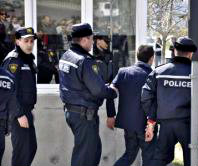
TBILISI, DFWatch–A new report suggests that a number of rights are violated when people are detained. They are not read their rights and have problems getting an interpreter and a lawyer during their first questioning.
These are the findings in a new report presented on Wednesday by Open Society Georgia Foundation (OSGF).
The organization hired independent experts to review 200 cases of detention in 2014 and 2015, in Tbilisi, Kutaisi and Telavi during a one month period. The report’s authors also spent a month on monitoring the process of detention and questioning law enforcers and defense lawyers.
Giorgi Mshvenieradze, one of the authors of the report, told journalists that the goal of the study was to reveal legislative and practical errors.
“There are errors about access to legal assistance, problems related to the documentation of detained people and their transfer to police facilities. The poblems concern the practice of so-called interview, which goes beyond legal bounds,” he said.
“There are cases when investigators read detainees their rights, but this doesn’t happen when an ordinary policeman detains a person.”
Such cases results in a person not being able to exercise his or her right to legal assistance and medical examination.
The authors of the report say that in most cases, detainees are unable to make use of the services of a lawyer during their first questioning. They recommend allowing detainees to contact a lawyer by phone.
Law enforcers usually explain detainees their rights only after they are taken to the police station. It would be better if law enforcers verbally explained the detainees their rights in an understandable way so that they could use those rights, the authors write.
Another problem is that legislation doesn’t specify where the detainee should be taken after being detained; the police station or some other detention facility.
While preparing their report, the experts discovered that police employees prefer taking detainees to the police station, but there are more safeguards to defend the rights of detainees in a facility known as an ‘isolator’. It would have been reasonable to properly equip the isolators and conduct the questioning there, the authors argue.
In the capital as well as other places, the Prosecutor General’s Office only hires English, German, French or Russian interpreters. There are no translators working in the Azeri or Armenian languages, which is why investigators were forced to find interpreters willing to work for free.
Prosecutor Natia Mezvrishvili attended the presentation of the Report at Tbilisi Marriott Hotel. She thinks it was very important report.
“The recommendations mainly include training prosecutors and investigators and it is quite possible to eliminate those issues,” she told journalists.

